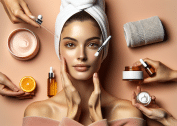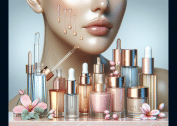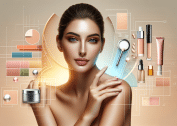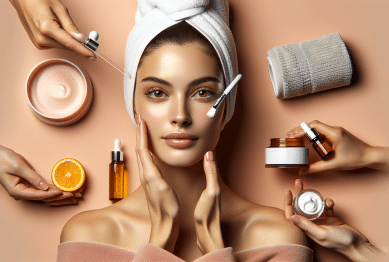Unlock the real potential of your daily routine with science-backed skin care strategies, emerging beauty trends, and holistic wellness tips. Discover how even small changes—such as using antioxidants or choosing the right moisturizer—can do wonders for your glow and overall wellness.
What Shapes Healthy Skin Beyond Genetics
Healthy skin isn’t just determined by your genes. Lifestyle habits and what you put on your skin play a major role. Key factors like diet, sleep quality, stress management, and your environment all merge to influence your complexion. Many notice that simple adjustments, such as regular gentle cleansing or adding antioxidants to a routine, can visibly improve skin health. Understanding these influences can empower individuals to make informed choices that lead to more radiant results. Continuous advances in dermatology highlight how consistent habits often outperform single miracle fixes, helping you foster real, lasting wellness.
Environmental exposure, including sun, pollution, and climate, impacts skin aging and sensitivity. Using a broad-spectrum sunscreen and antioxidant serums creates a crucial protective barrier. Recent research shows that even short daily exposures to UV rays accelerate the visible signs of aging, from fine lines to uneven tone. Incorporating these preventive steps builds resilience and paves the way for healthier skin as the years pass. The integration of gentle, scientifically-backed products has grown in popularity as more people focus on prevention.
Stress management also has an underestimated effect on skin health. Chronic stress can trigger flares of acne, eczema, or psoriasis due to hormone fluctuations. Stress reduction techniques, such as mindfulness or moderate exercise, can calm these reactions. Dermatologists increasingly recommend holistic approaches for maintaining vibrant, even skin. Many discover that investing in mental well-being is as critical as the right topical treatment.
The Real Difference Antioxidants Make
Antioxidants stand out as powerful allies in any skin wellness journey. They are found in both topical serums and diets rich in colored vegetables and fruits. Vitamin C, vitamin E, and niacinamide are a few that dominate beauty conversations due to their proven benefit in neutralizing free radicals. Free radicals, produced from pollution or sunlight, damage skin cells and speed up premature aging. Regular use of antioxidant-rich creams helps protect against these threats for many individuals.
Dietary sources of antioxidants are equally important for protecting and rejuvenating the body from within. Spinach, blueberries, green tea, and citrus all contain natural compounds that counteract cell stress. Experts often recommend combining dietary and topical solutions for full-body benefits. This synergy can lead to improved tone, smoother texture, and greater hydration over time. Skin often appears brighter and more even when these habits are maintained, supporting the connection between nutrition and beauty.
The surge in interest around natural and ‘clean’ beauty options has led to more antioxidant-infused skin care launches. These formulas aim to deliver the same science-backed benefits with fewer artificial additives. While product choice should always align with individual sensitivities, people who select multi-antioxidant blends frequently report reduced irritation and enhanced glow. Thoughtful application and ingredient awareness continue to shape the modern approach to skin wellness.
Moisturization: More Than Just Hydration
Many people underestimate what a good moisturizer can do beyond preventing dryness. A well-formulated moisturizer works to lock in hydration, repair the protective skin barrier, and add suppleness. There are various types, including creams, lotions, ointments, and lightweight gels for oily skin. Ceramides and hyaluronic acid are highly favored ingredients, each supporting moisture balance and resilience. Consistent use of an appropriate moisturizer can now be considered a foundational step in daily routines.
Layering is a technique some find useful, especially in drier climates or during seasonal changes. Applying a serum underneath a heavier cream can seal in active ingredients, maximizing their benefit. Recent studies highlight the importance of selecting products without harsh fragrances or alcohol, since sensitivity and irritation can arise from these additives. Dermatologists remind people to patch-test and adjust as needed depending on how their skin feels and reacts.
Hydration is also supported from within. Drinking adequate water and eating water-rich foods, like cucumbers and watermelon, can complement external care. Both external and internal hydration provide ongoing nourishment, which is seen in plumper, smoother skin over time. Addressing dehydration holistically can make visible changes, illustrating how integrated wellness truly supports beauty goals.
Emerging Trends in Skin Wellness
The world of wellness and beauty is always evolving. Recent advancements include microbiome-friendly products and the use of plant-based actives, like adaptogens. The skin’s microbiome, a collection of beneficial bacteria, can be nurtured with probiotics and prebiotic skincare. These approaches aim to strengthen skin’s natural defense against irritation and imbalances. Many experts suggest that microbiome-focused products will continue to grow in popularity for their personalized support of healthy skin barrier function.
Another breakthrough trend involves blue light protection. With increased screen time, skin specialists highlight the impact of blue light from devices in addition to traditional UV rays. Ingredients such as licochalcone and algae extract are being added to formulas for extra protection. While the long-term effects of blue light exposure are still under investigation, early research encourages a proactive mindset when developing a skincare regimen in the digital age.
Sustainable and eco-friendly beauty has become more than just a buzzword. Consumers are actively seeking biodegradable packaging, cruelty-free certifications, and formulas with minimal environmental impact. This shift reflects a holistic understanding that well-being extends beyond the individual to community and planet. Practices such as ingredient transparency and supporting ethical brands make a difference, offering a sense of empowerment for anyone dedicated to wellness and beauty.
Mindful Routines Lead to Consistent Beauty
Consistency is the unspoken hero behind glowing, resilient skin. Daily habits—even basic ones—build a strong foundation for lifelong wellness. Morning routines often include cleansing, moisturizing, and sun protection, forming a ritual that helps maintain results. Alignment between product choices, routine regularity, and personal lifestyle factors has been linked to higher satisfaction in long-term studies, suggesting that mindful repetition matters.
Night routines are equally important. Cleansing before bed removes daily grime, while targeted treatments like retinoids or replenishing masks encourage overnight repair. Prioritizing sleep itself—seven to eight hours per night—is another cornerstone. This allows the body and skin time to recover and rebalance. Those who carve out mindful evening routines often experience smoother texture and fewer flare-ups the next day, reinforcing the value of caring steps.
Practicing gratitude and self-compassion within beauty habits may sound simple, but these attitudes can enhance the effectiveness of any routine. Studies suggest that stress reduction and a positive outlook support the skin’s barrier and healing capabilities. Incorporating habits like gentle massage or mindful breathing while applying products can turn daily care into uplifting self-rituals, merging beauty, wellness, and overall happiness.
When to Consult a Professional for Skin Concerns
Some skin issues require professional insight. Sudden or severe changes—such as persistent redness, itching, or unexplained breakouts—should prompt a visit to a licensed dermatologist. Chronic conditions like rosacea, eczema, or severe acne can often benefit from a tailored treatment plan. Early intervention by a specialist not only protects skin but can also prevent more complicated health concerns down the road.
Teledermatology and online consultations have made expert skin care advice more accessible. Through these virtual visits, people can receive evaluation and evidence-based recommendations without leaving home. This modern solution is especially useful for follow-up appointments or when local specialists are unavailable, making it easier to access care regardless of location or circumstance.
Professional guidance is also valuable for aesthetic procedures, such as peels or microneedling. Dermatologists or trained estheticians can provide insight into which options align best with individual skin types, sensitivities, and goals. Seeking medical advice ensures safety and maximizes results, raising the bar on wellness and beauty pursuits for everyone.
References
1. American Academy of Dermatology Association. (n.d.). Skin care: Tips for healthy skin. Retrieved from https://www.aad.org/public/everyday-care/skin-care-basics/care
2. Harvard Health Publishing. (n.d.). The benefits of antioxidants. Retrieved from https://www.health.harvard.edu/staying-healthy/foods-and-drinks-rich-in-antioxidants
3. Mayo Clinic. (n.d.). Skin care: 5 tips for healthy skin. Retrieved from https://www.mayoclinic.org/healthy-lifestyle/adult-health/in-depth/skin-care/art-20048237
4. Cleveland Clinic. (2021). Skin hydration tips and routines. Retrieved from https://health.clevelandclinic.org/how-to-keep-your-skin-hydrated/
5. British Association of Dermatologists. (n.d.). Consult a dermatologist. Retrieved from https://www.bad.org.uk/patient-leaflets/consult-a-dermatologist/
6. Environmental Working Group. (n.d.). Skin Deep® Cosmetics Database. Retrieved from https://www.ewg.org/skindeep/









